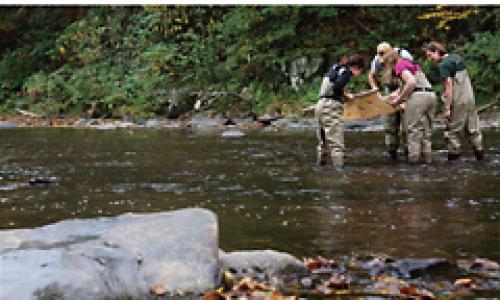Lack of access to governmental information has had significant negative consequences for both the environment and human health. This forum, the first in the Lewis M. Branscomb Science and Democracy Forum series, set out to identify and advocate for ways to improve access to governmental scientific information.
The centerpiece of the forum was a half-day symposium, held at the Newseum in collaboration with the First Amendment Center, hosted by Center for Science and Democracy director Andrew Rosenberg. The program included remarks from Congressman Edwin Markey and former Congressman John Edward Porter, as well as two discussion panels featuring distinguished civil society leaders, journalists, scientists, and agency administrators.
Leading up to the event, UCS hosted a webinar to highlight the consequences of inadequate information and recent attacks on the Freedom of Information Act, and a conference call to introduce the Forum topic and the new director of the Center for Science and Democracy to an engaged national audience. Following the symposium, UCS held a problem-solving workshop to develop recommendations for the executive branch on how to manage and make information accessible during crisis situations.
Symposium: Improving Access to Government Scientific Information
The dangers of inadequate information
Historically, the withholding of information by the government has had serious consequences. In the aftermath of devastating September 11 attacks, the federal government instructed the Environmental Protection Agency (EPA) to withhold information about the dangers of the air quality around ground zero. For example, data showing a dangerous level of asbestos—a known carcinogen—were removed from the EPA report. Now, over a decade later, first responders and residents suffer from a range of ailments, including a respiratory illness known as “World Trade Center cough.”
Similarly, after hurricane Katrina the Center for Disease Control (CDC) suppressed information about the level of formaldehyde in the trailers provided to victims of the storm. Formaldehyde is used in many building materials and overexposure can have serious health effects. As industrial hygienist Mary Devany testified to Congress, the short-term effects include “headache, dizziness, nausea, loss of sense of smell…fatigue, respiratory system irritation, nosebleeds, sinus infections, throat irritation, coughing, and chest congestion,” while long-term exposure “may cause brain cancer and possibly leukemia.”
It was not until months after the Sierra Club began measuring formaldehyde levels in trailers that the FEMA requested that the EPA conduct official sampling. The two organizations both concluded that “[n]early all of the trailers sampled had form levels at least three times the proposed level for healthy physically fit sailors exposed to form on a submarine for only 90 days,” according to Devany’s testimony.
FOIA: An important tool in the fight for access
Luckily, there are some methods in place for most people to request information from the government. One of the most significant is the legislation known as the Freedom of Information Act (FOIA), which was passed in 1966. This law states that any citizen has the right to make written requests for records of federal agencies and that the agencies need to provide the information requested, unless it falls under one of nine exempted classes of information.
It is through FOIA requests that we are able to attempt to find important information such as locations of coal ash dumps, or how the FDA is using categorical exclusions to avoid regulating the use of livestock antibiotics.
FOIA is far from a perfect system, however. Many requests are denied, and there have been many attempts to restrict the effectiveness of FOIA. In addition, when it comes to crisis situations there often is not time to wait for the government to respond to a FOIA request.
We need government to be proactive, not reactive, on making information available to the public. This forum will engage a number of experts both within government and within communities fighting for open access to begin a dialogue about the best ways we can tackle these important issues and push government in the right direction.



